#forced conscription is evil
Explore tagged Tumblr posts
Text
FUCK. THE. TORIES.
They have refused to increase wages whilst forcing the cost of living to skyrocket so high that nearly all of us are counting pennies to pay bills. If we can pay them.
They intentionally and gleefully forced us into a horrible economic (and cultural) depression through Brexit, and not one of them had a single consequence for the constant lies they told to get it passed. This will only get worse.
They have intentionally dismantled the NHS by underfunding it to the point where the NHS staff are all burnt out (having nervous breakdowns, leaving the country for far- better paying jobs or just leaving the field completely) just so they could sell it off to privatised companies worth billions just so they can fill their own pockets. Oh, and the incredible capable staff (medical or support) who were all from Europe have been told they are no longer welcome here and they have returned home because Britain is a cesspool of bigotry and hate
They are dismantling the social care systems for the disabled and elderly, to try to force us back to work even though we are physically and/or mentally incapable of work by stripping away our incomes.
They're doing everything they can to keep us from living by making sure we cannot afford food, housing, utilities, water, and tax.
They are living on taxpayers whilst having millions, even billions in the bank for themselves.
The corrupt politicians fill their bank accounts and buy third and fourth houses across all Europe, another boat— whatever— and they have scandal after scandal with absolutely no consequence, and we can do absolutely nothing.
Their handling of COVID was criminal, and aside from wasting an incredible amount of money, they are responsible for many deaths by not acting fast enough and by forcing people back into the workplace when they knew it was not safe because they wanted to improve the economy they collapsed.
Oh, and don't forget all those lovely parties they had during COVID lockdowns when we were all in our houses and not allowed to see family members who were dying-- or even go to their funerals because of COVID restrictions.
They are intentionally fuelling the hate at queer people-- specifically trans people. This, I assure you, will get so much worse.
They keep sending money from taxpayers over to fund wars in other places-- including genocide-- with no way for us to fight back.
They keep making law after law making it more and more difficult for us to protest against everything they are doing.
Now the Tories expect you to do 12-18 months (+4 reserve years) of mandatory conscripted service in the military so you can go help countries commit war atrocities and genocide. And if you refuse, you are sanctioned. And they are making more and more laws restricting protest and free speech, so if we fight back, we're punished-- criminalised.
Do you understand what is happening right now?
Anyone who can still vote for the Tories after all of this, I have only a deep seeded concern for their sanity, and revulsion at their lack of morals.
FUCK EVERYONE WHO WILL OR HAS EVER VOTED FOR THESE MONSTERS.
FUCK.
THE.
TORIES.
FUCK.
THEM.
ALL.
#fuck the tories#forced conscription is evil#they want you to go fight against Palestinians#they want you to help the genocide#if you can still vote for the tories after knowing everything they have done i just cannot speak to you#fuck british politics#fuck rishi sunak#fuck everything#rishi sunak#is a psychopath#and the worst prime minister after Thatcher#christ I hate these people#general election#uk general election#uk politics#tories#conservatives#i fucking hate these people you have no idea#The tories WANT WWIII#these people are psychopaths#fuck everyone who will and ever has voted tory#the people are soulless monsters#The closest thing to a vampire in this world are the tories#Sunak is so stupid he went to Northern Ireland to campaign for the general election#Northern Ireland does not have the Tories or Labour in the ballot#this man is so stupid he’s trying to get votes from Northern Ireland. neither Labour nor tories appears on Northern island ballots#rishi Sunak you absolute potato#I am so tried of wealthy corrupt psychopaths running the world#Do you want to go to war? Do you want to kill innocent children and weak old people?#cos if the tories stay in That is exactly what will happen. You will be sent to commit genocide on victims
47 notes
·
View notes
Text

idols/people who do this aren’t “overachievers” they’re bootlickers. stop attributing it to jeongguk. hope this helps.
#i hate this fucking sentiment y’all are so annoying#it’s the MILITARY.#it’s forced conscription!!!!!! which is evil!!!!!!!!!!!#this isn’t a video game!!!!!!!!!!!!#and men who volunteer to do more than what’s forced aren’t any better than any other member of the military!!!!!!!!!!!!!
16 notes
·
View notes
Text
"I have no idea what you are talking about. The emperor made it very clear that this is a voluntary conscription only those of age can accept. We are not forcing anyone to fight or go to war and certainly not any children. The emperor is evil, not insane."
2K notes
·
View notes
Text
Rambles in Star Wars History: The extreme shenanigans that changed an Empire
Bioware games can absolutely fascinate me, in part because of their worldbuilding, and in part because of where the worldbuilding ends. I mean, I did a whole long series of posts on the grammar of Qunlat and I have at least a dozen essays worth of material of exegetical analysis of religion in Dragon Age kicking around in my brain, which I keep threatening to actually manifest.
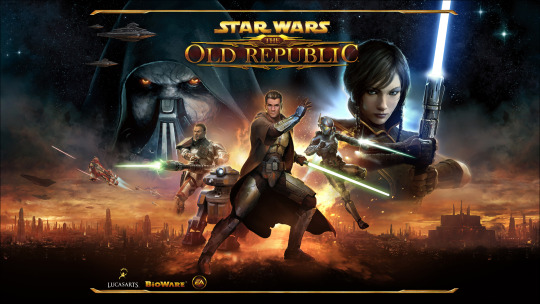
But since I'm here with my worldbuilding hat on, I'm going to ramble about Star Wars: The Old Republic, focusing on some of the sometimes-hilarious drama that's implied by the plot, and the implications for how these shenanigans remade a major galactic society in the process. Involved will be a man who faked his death to get out of going to meetings, a wine uncle who might become emperor, a living scowl with dangerous shoulders, and other assorted animals.
Expect a lot of bonus rambles in the image alt-texts, which is where I store commentary and jokes that I can't fit into the flow of the main post.
———
Before I dig into the topic at hand, I have to set the scene for those who don't know the game, or have forgotten in the fourteen years since the game launched.
Spoilers in the post below for Act 3 of the Sith Warrior and Inquisitor storylines, Act 1 of the Jedi Knight and Imperial Agent storylines, the post-Act 3 Battle of Ilum flashpoint, and for various expansions including Rise of the Emperor, Knights of the Fallen Empire, Onslaught, and Legacy of the Sith. Assume that all reference links to Wookieepedia contain major spoilers.
SWTOR is an MMO set 3600 years before the Skywalkers crashed through the ceiling tiles of the galaxy, though it's not to say anything was less chaotic back then, just different chaos.

(Pictured: Anakin Skywalker, circa 32 BBY-4 ABY)
In this time, the titular Old Republic is opposed by a Sith Empire, which is precisely as functional as one might expect. After a decades-long conflict that ended with a Sith victory but left both sides exhausted, a state of cold war began. The Jedi, their Grand Temple destroyed, left Republic space to settle on an ancestral world. The Republic, battered and reeling, tried to recover its stride through use of its superior size and resources, and producing a truly unhinged number of superweapons.

The Sith Empire, in some ways, tried to pretend everything was fine for quite a while. They had successfully forced the Republic into a favorable treaty to end the war. They'd gained territory, they had a lot of work to do there.
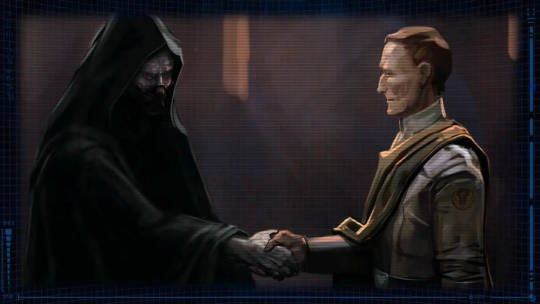
…But as things started to look more and more like war again, they were left with the uncomfortable realization that they had sorta kinda killed most of the Sith in the last war, and Imperial citizens in good standing weren't producing enough Force-sensitive kids fast enough to rebuild the losses. Might've had something to do with most of them being dead.

The Empire, of course, is an absolute clusterfuck of a society. Slaves toil to maintain its power. Children of a slave and a citizen will be citizens themselves—unless they're "aliens", a category that includes everyone that isn't a human or a Sith pureblood, the original Sith species.
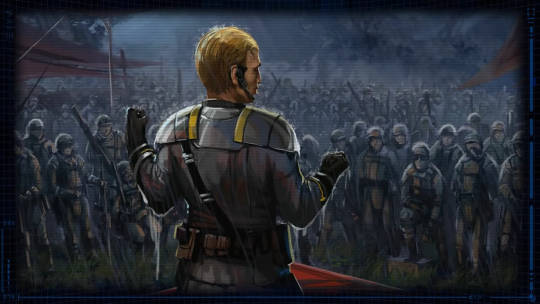
Being a citizen isn't great either: The Force-blind face mandatory conscription into the military, and can never rise to the highest echelons of society. Above them, the Sith act as a semi-hereditary aristocracy of evil space-wizards that serve an immortal, eldritch Emperor, their living god who has also kiiiind of gone AWOL for reasons only a few of them understand. He's torn between doing his job or staring at a living paperweight, and the paperweight has been winning. He also recently got trapped by an evil hole in the ground, it's complicated.

With the Emperor incommunicado, the duties of the state fall to the Dark Council, a ruling body of up to twelve Dark Lords of the Sith. Each have their own sphere of governmental influence, which are, one can only assume, very dark as well.
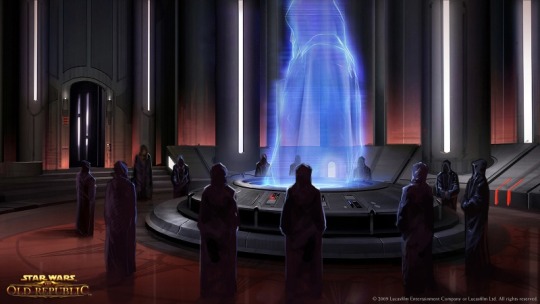
Presumably, the Dark Council had something to do with the inevitable yet still surprising solution to their space wizard deficit: over a thousand years of laws were suddenly overturned. Slaves, aliens, and prisoners were not only permitted to become Sith, it was now mandatory that they report for induction into training programs if they possessed any hint of Force-sensitivity.
This is how one of the eight protagonists of the MMO gets their start: if you play the Sith Inquisitor plotline, you begin as a former slave who has survived basic training and made it to the Sith Academy, where your teacher dearly wants to kill you. Your first mission: survive school.
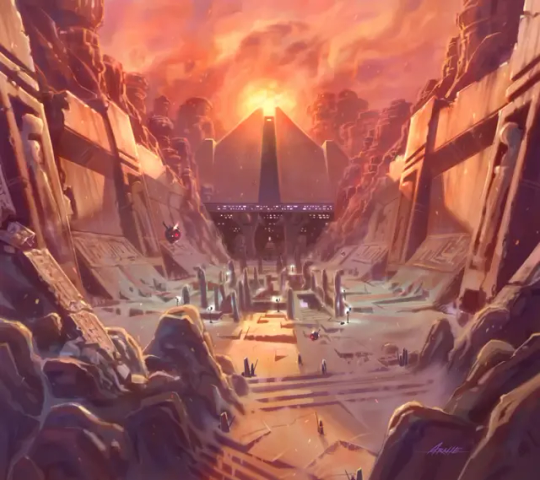
I'm sure this is very relatable to quite a lot of you.
Now that I've got my PhD with only a few gray hairs, I'm looking back at this premise and thinking: This would completely upend the social framework of the Empire. You'd have every established Sith Lord in the Empire scrambling to kill these threats to their power, or harness them against their enemies, or both.
This is actually canon, but canon never touches on the broader, systemic implications of what the new Sith would do, and who they were before—Sure, the overseers of the training programs seem to be doing their damnedest to kill and undermine the newbies while maintaining plausible deniability, but enough of them survive to reshape the Empire. We know that. You play as one of them.
How in the fuck did the Dark Council ever manage to get this policy implemented in the first place? Obviously they did somehow, but the specifics are never mentioned.
But the specifics have the possibility to be hilarious.
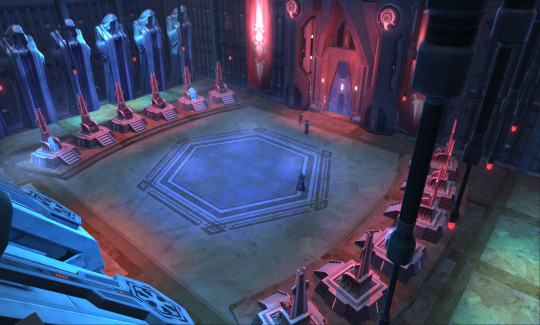
The Dark Council itself is composed of Sith who either killed their way to the top, or inherited their seat from their Sith master—who they probably murdered. Turnover on most Council seats is incredibly high. The Spheres of Ancient Knowledge, Technology, and Military Offense each have three different Councilors within a single year, for example.
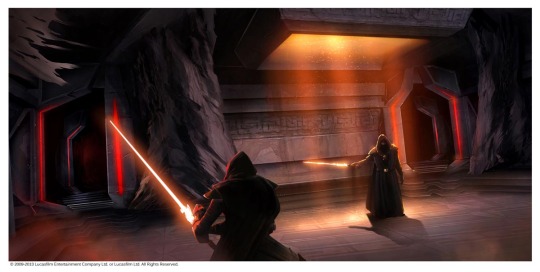
This also means that whoever ends up in charge of a Sphere might be entirely unsuited for it. Who heads up the Sphere of Expansion and Diplomacy? The least diplomatic guy on the Council, naturally. He goes by Darth Ravage, which fits in well enough with the three different Darths whose names mean 'death' (Thanaton, Mortis, and Rictus). The player can even end up as Darth Nox--'Darth Night'. You get the title by killing one of the Darth Deaths.
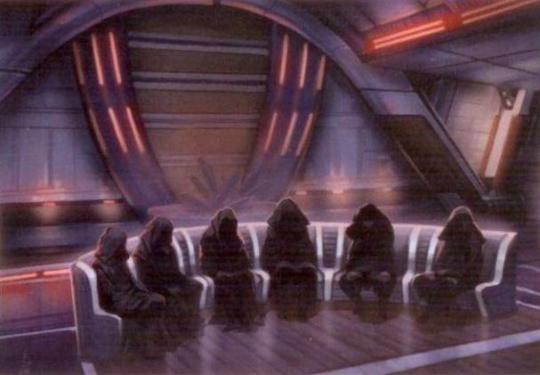
So, which of these barely-domesticated evil goths probably voted to allow 'inferior' beings to become Sith, overturning a fundamental tenet of imperial sith philosophy? Probably not the guy in charge of Sith Philosophy! We never see him, but he seems to have been a traditionalist. On the other hand, Darth "Murder has no rules" Ravage might not be huge on tradition, so we can mark him down as a "maybe". But he doesn't seem to be an instigator for something like this.
But on the subject of instigators: Darth Jadus.
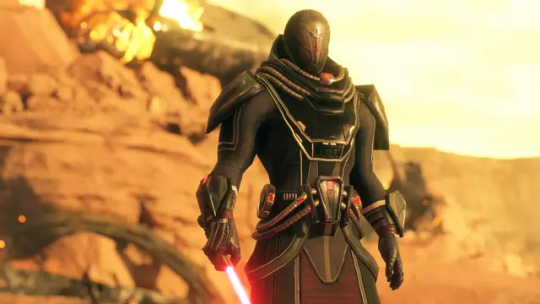
Darth Jadus is an experience. While many of the other Council members make it quite clear they're angry enough to chew on the furniture, Jadus unnerves all of them by being utterly calm and composed, as long as you don't count how intensely fervent and irrational he sounds when he starts talking about the Dark Side. He's unhinged in a distressingly hinged-seeming way.
Heading up the Sphere of Intelligence, Jadus is a noted iconoclast on the Dark Council, using his authority to open Imperial Intelligence positions to aliens. He chooses slaves and Force-blind citizens to be his advisors and agents, ignoring the traditional power structures of the Sith. He prefers his literal cult following of fanatical adherents instead, who see him as a visionary savior, a terrifying inevitability, or both.
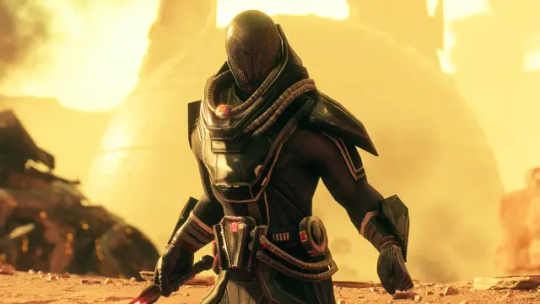
This means he seems to have basically no interest in elevating other Sith. In fact, he hates the way the rest of them run the Empire. Making more of them might potentially be against his interests.
Or at least it would be, if he didn't have some long-running secret plans that he wants to keep the other Dark Council members from catching wind of. Advocating for slaves, aliens and convicts to become Sith would superficially fall in line with his philosophy, and just raising the idea in public could cause such social chaos that his true plans would benefit from it. Jadus is also the most genre-savvy sith in the entire game: he seems to almost be aware at points that he's neither the protagonist nor main antagonist, and thus his evil plans involve not messing with either of them. When he jostles up against the main plot and realizes he has no plausible means to derail it, he responds by leaving the plot entirely.
Given the tactical chaos and uncomfortably fourth wall-touching strategies Jadus makes use of, let's mark him down as a "yes".
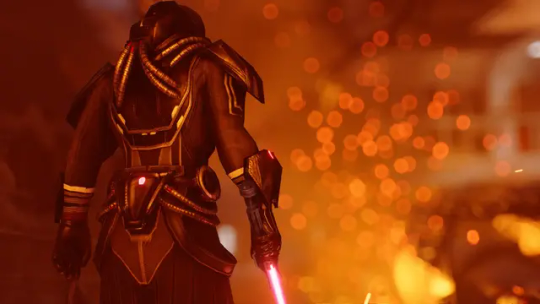
But Jadus is an unpopular one on the Council. He's creepy. Sith HATE feeling creeped out. That's supposed to happen to other people, dammit, not them! And with his disinterest in politics and his deep interest in foisting his manifesto on everyone, he's not the most effective Dark Councilor.
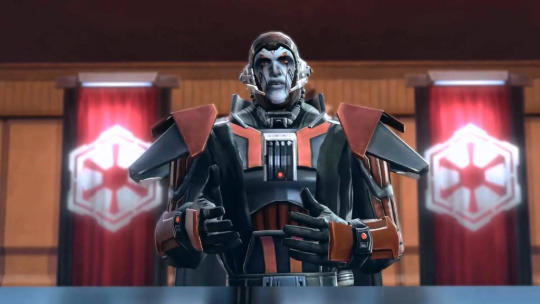
He might be able to pull in a few—Darth Decimus, head of Military Strategy, seems to have been quite willing to exploit any advantage he might be able to squeeze out of a situation. Fun side note, his voice actor also played the First Order officer who was just so done with Hux at the beginning of The Last Jedi.
youtube
[Video Description: A compilation of Mark Lewis Jones as Captain Moden Canady from The Last Jedi, with the video quality partially encrunchified by YouTube. This includes all of his shots from the film, from arrival of the Seige Dreadnought Fulminatrix, to the extremely annoyed look he gives the fireball that kills him. Sound supervisor Matt Wood was apparently pretty sure "FIRE ON THE BASE!" was going to be used as an EDM drop, and I can confirm, I've heard it out in the wild.]
Who else have we got rattling around in this Council, who might have extremely ridiculous reasons to vote yes? Well, we have Darth Vengean, head of Military Offense, was all about the Offense. Who needs defense? That nerd Darth Marr? HA! No, Vengean wanted to restart the war with the Republic. More bodies for the war machine would probably be fine with him.
Speaking of that nerd Darth Marr, Darth Marr.

Apparently he designed this armor himself. Solid effort, my man.
Marr is in his sixties by the time the game happens. He's one of the longest-surviving Dark Councilors, and he sounds so tired of his coworkers in every scene he's in. Heading up the Defense of the Empire, Marr also is the de facto leader of the Dark Council, by dint of being the only adult in the room.
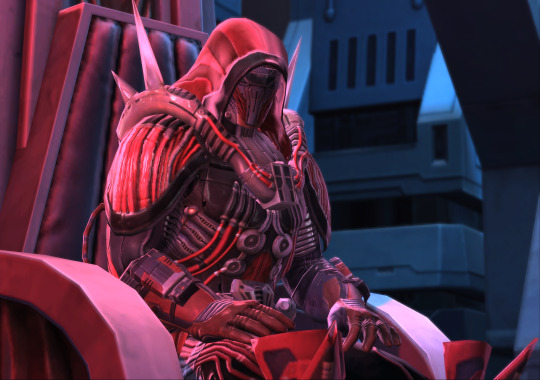
Much like Jadus, he distances himself from the backstabbery and rivalries among the Council members. Unlike Jadus, he 100% means it, and has been focused on not making the Empire explode. He eventually ends up as the unofficial leader of the Empire until he gets one-shotted so hard it makes his ghost chill out a bit. He keeps the spikes, though.
So, if there's anyone on the Council who might vote for this on purely practical grounds, and has the power to push others into agreeing with him, because so help him if they don't stop holding duels in the conference room he's going to turn this Empire around—
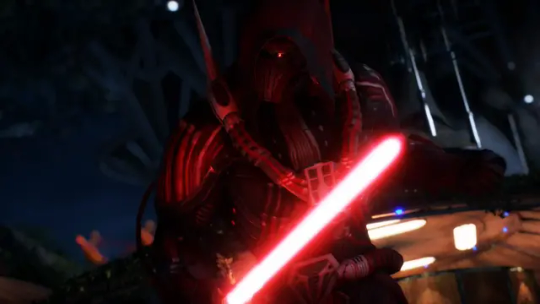
Nobody listens to him on that, by the way. Both the Sith main plots involve duels in the conference room.
In fact, one of those duels is egged on by our last suspect. Marr might be a contender for longest-running Dark Councilor, but there is another candidate: Darth Vowrawn, who seems to be having a much better time being on the Council than Marr. I suspect the only reason why he doesn't have a bucket of popcorn with him in the Council chambers is because somebody made a rule that he had to stop doing that.

Vowrawn is a surprisingly cheerful old bastard who seems to have turned his hobby into his job. He shows up 'fashionably late' to someone else's attempted coup, after lamenting he can't sell tickets to the clusterfuck that's about to commence. In the expansions to the game, he can outmaneuver and outlive all of the competition and end up becoming the Emperor, at the age of 87.

Vowrawn is also indifferent to against the Empire's policies--he supports the ascension of a Zabrak to the Dark Council, and takes one as an apprentice as well. Beyond that, Vowrawn would have to support this move, because he's instrumental in any large project like this, both politically and practically. While the others I've mentioned all have roles explicitly to do with the aggressive expansion or protection of the Empire, Vowrawn heads the Sphere of Production and Logistics. In essence, he's the one who can decide whether all these other bozos get to eat or not.
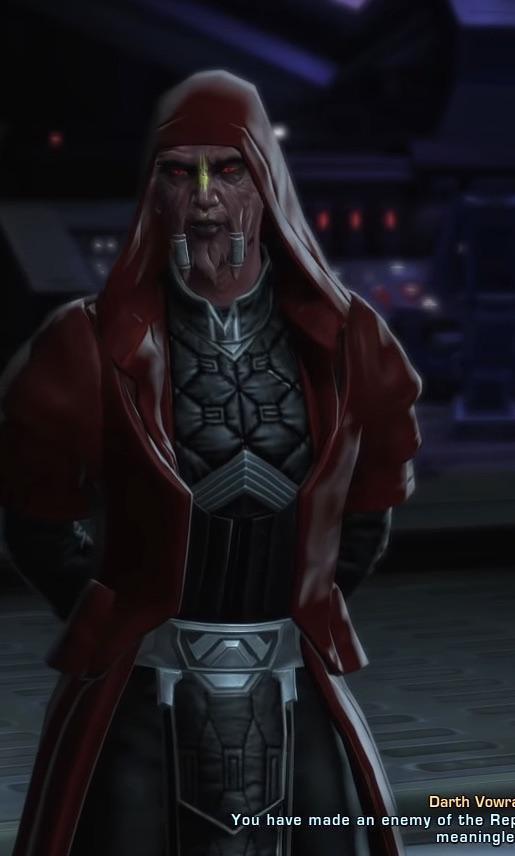
If Vowrawn didn't accept this change, then it would have failed. So, he's a definite "yes" by default.
Speaking of bastards who are still active well into their eighties, we have one last major figure who isn't on the Council that likely advocated for this: Darth Malgus.
youtube
[Video Description: The "Deceived" trailer, set ten years before the game. God, I love this thing. This was the first trailer I saw for the game, and it got me, it really did. The Sith are just as ridiculous as they should be, combined with choreography that feels a lot more crunchy than lightsaber combat had been before, with distinct combat styles for the two main fighters. It's quick, it's impactful, and it's got a memorable conclusion. Love it.]
Malgus is as anti-racist and anti-classist as Jadus is, but without the insane transcendental Dark Side philosophy. Instead, he has an insane philosophy of bettering the Empire through eternal war, which he believes everyone should have an equal ability to participate in. He is what would happen if a Warhammer 40k character had an inside voice.
youtube
[Video Description: The "Disorder" cinematic trailer, set before the Legacy of the Sith expansion. Malgus is 75 here. Man's held together by spite and screws and whatever nutrients you can absorb by being thrown through walls. He's fully given up on the Sith Order at this point and is trying to do his own thing, and he makes it look rad. The choreography has only gotten better, goddamn. Why did it take me three goddamn years to watch this. IT'S REALLY GOOD.]
Malgus is a big deal in the military, with a lot of support from both the Force-blind soldiers and earning the loyalty of a surprising cross-section of Sith. We know this, because he nearly hijacks the Empire at one point in the early expansions. He'd be into this idea, and he probably advocated for it. While he'd have the most direct interaction with the military-related Councilors we already have in the "yes" column, he also has a history of annoying the bejeezus out of other Sith on "his" turf, so who knows! He may have been more persuasive to the others we haven't dug into.
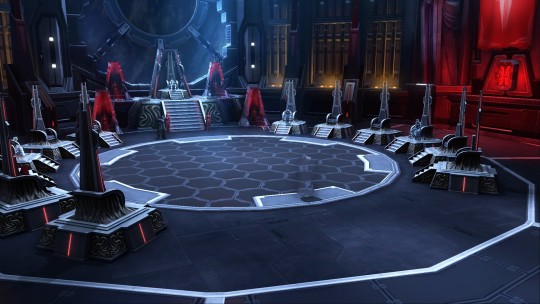
And we can't really dig into all of them at the depth we have with some. Despite how bogglingly huge SWTOR is and the two thousand four hundred and ninety-five named characters and "Additional Voices" credits in IMDb, we never meet some of the Dark Councilors. If you don't play all the eight main storylines, you won't see all of them in the game. I'll admit, I've never seen Darth Hadra, because I've never gotten that far in a Republic-aligned storyline! The Sith you encounter in their stories can often be more one-note, because they're purely there as antagonists rather than people you are legally required to hang out with, and thus have more opportunity to pester mercilessly.
[Video Description: A clip from my own Warrior run-through, featuring my big lad Rejalgar, his coolest friend Vette, and his boss, Darth Baras, who is presently having a screaming tantrum, which Rejalgar makes worse with the most delightfully straight-faced "Is there a problem here?". The Warrior plotline lets you play things sincerely evil, sincerely noble, or sincerely hilarious. Do you want to see Jedi bluescreen when a Sith just straight-up refuses to be violent? Do you want to sidestep a boss fight by offering a family a government pension, something your boss commends as being very devious and evil? Do you want to break up a fight between gangs by threatening to eat them? Come play the Sith Warrior storyline, and be the chaos you want to see in the galaxy!]
youtube
[Video Description, from a clip I uploaded to YT specifically for this post after I found out you can only upload one video per tumblr post wtf: A clip from my Inquisitor run-through, featuring my extremely shirtless lad, Sericus, playing coy and a little airheaded when called up by his Sith master, Darth Zash. Back in the day, Purebloods weren't supposed to be played as canon for this storyline, but there were tweaks later made to dialog that provided a canon explanation for how someone with visible Sith ancestry could end up in this situation. The storyline, however, unfortunately does not fully account for a character whose ideal job description is 'villain's beautiful and deceptively intelligent consort, the true power behind the throne'. It assumes you're playing a character who wants to go conquer and/or do mad wizard-science. Bonus points for eventually letting you marry your eight foot tall razor-faced cannibal thrall though, that's very fun.]
Why don't we see all of the Dark Council? Well, because they're ultimately not important to the story as a group. Events keep you locked tightly under the purview of just one or two of them on the Sith side of things, before the post-game and expansion plots launch you into the experience of being a major player in Imperial affairs, and Imperial affairs launch themselves at you in return.

Everyone realizes the Emperor wants to eat them. Then he dies, except he doesn't. Malgus takes over the Empire for a few weeks. Marr takes over, but half the Council is dead and the rest are still in orientation and are probably also dead, because their would-be successors assassinated them. The Emperor, only mildly inconvenienced by also being dead, eats a planet. Then things go completely off the deep end, and the Dark Council is no longer your concern at all.

It's economical storytelling to not belabor the rest of the Councilors, and playing through as an ex-slave Inquisitor, you continue to face enough challenges directly linked to your background that the resistance feels systemic, even if you don't actually see all that many others who are facing the same issues.
But I think there's a lot of potential for some really wild storytelling in there. Your character receives some level of basic training before they reach the Sith Academy, along with a whole batch of ex-slaves. What did that entail? How was it organized? What happens when folks from abolitionist movements start being trained as sith, gaining all the attendant legal authority over the life and death of others?
And what about the prisoners who were released for training? While one canon option is to play a character who was facing immediate execution for participation in violent anti-Imperial resistance, at least a fair chunk of Force-sensitive prisoners were probably serving longer sentences. What happens when prison gangs start gaining a foothold in the Sith Academy, where they're too dysfunctional to even form Mean Girl cliques? What happens when some of their members become full Sith? How many of them might have Hutt backing, or even funding from the Republic Secret Intelligence Service?
These are the sorts of things the Sith themselves are terrified of. This earns a very sarcastic thoughts and prayers to them, of course. Yet it truly is wild to think about the decision-making process that went into this massive societal shift that the game treats as simply a piece of inciting incident for two plotlines out of eight: Twelve unhinged people sat down in some extremely high-backed chairs one day and voted to give everyone equal access to lightning.

I love Star Wars, it's just the funniest shit imaginable sometimes.
#star wars#star wars: the old republic#swtor#swtor meta#darth jadus#darth marr#darth vowrawn#the sith empire is held together with only chewing gum and bad vibes#and it's hilarious#love these terrible idiots
159 notes
·
View notes
Text
"Everyone gets along because there is a threat", yadda, yadda, yadda.
Bullshit. This is not how real scenarios work and it has never been.
russia is a global threat right now, but the world can't decide between sucking its dick and politely asking it to stop because the mere thought of confronting russia makes it shit its pants. The very few countries who scream into the void, warning about russia and telling people to wake the fuck up are ignored and viewed as crazy doomsayers.
This is how real crisis looks like. Nobody works together against a threat because people are spineless cowards who would rather throw their neighbors under the bus than fight. Nobody learned anything from history lessons, books or survivors.
The only difference in a fantasy game is that NPCs end up having more spine and moral principles than real people.
But in Veilguard, everyone gets along because they have NO reasons not to.
Davrin has no real reasons to beef (if you can call it that) with Lucanis because he is a Grey Warden. He knows where Grey Wardens take their conscripts from. He knows that Grey Wardens regularly recruit mages who are a lot more likely to get possessed if they're not careful. Working with an assassin who knows friend from foe isn't the worst thing ever. One subtle warning about taking action if demon takes over is enough.
Taash has no reasons to antagonize Emmrich aside from horrible writing.
Neve gets along with Bellara because writers gave Bellara a happy childhood with her family and turned Dalish artifacts into Apple store gadgets, while refusing giving Neve any nuance as the citizen of Tevinter.
Emmrich gets along with everyone because he is generally a kind and well-mannered person who doesn't like to stir the pot.
Any companion who could have had a sharp edge, got that edge ripped off and a cartoon band-aid slapped on.
Never doesn't deal with people who don't know about Shadow Dragons (and they probably shouldn't know much because when you work against a powerful government who wants to destroy you, you shouldn't show off), so she constantly has to deal with the fact that people assume she is a noble or a slave-owner because she is from Tevinter; that they don't know that she had to literally fight against being enslaved herself because in Tevinter mages who refuse to use their power to dominate others are turned into slaves as well.
Bellara isn't conflicted about working with humans, especially Tevinter humans at all. She seems to never have dealt with oppression her whole life and she is super quick to write off Cyrian as evil even though there are clear SIGNS that he was tricked and controlled by the Forgotten One. But no, she never thinks "He is still there, I can save him, I won't lose him again", she goes straight to "Oh nooo my brother is dead to me".
Emmrich doesn't get burdened by people reacting to him and his sincere intention to help with fear, because of all the sinister rumors revolving around necromancers and Nevarra. He isn't hurt by people assuming that he loves death and things dying. If even he openly admitted that he is deeply terrified of death, they wouldn't have believed him.
Harding isn't burdened by the revelation she learned and what to do with it. Should she storm her way to the Orzammar? Should she talk to fellow surface dwarves and reconnect them with their history? Should she never breach the subject because the truth hurts and it's too much pain, too much anger to live with - and maybe she shouldn't let other dwarves go through it?
We don't even have a party divided on what to do with Solas (kill or talk it out)? Even though it's logical to have companions who are convinced that Solas has to die and those who think that he is misguided and can be convinced to stop.
Also, there are NO companions whose background, viewpoints and attitude would rile other companions up. We have no controversial characters whose interactions with the crew Rook would have been forced to intervene in unless they want their team to start throwing hands with each other.
We could have had Imshael - to give EVERYONE a reason to worry, and argue, and have conflicts. We could have had an ex-Venatori Calpernia bashing heads with Neve, Bellara, and Emrich. We could have had a Qunari spy who'd make Lucanis' dagger-arm itch.
If writers didn't forget about the Architect, we could have had an intelligent Darkspawn companion Davrin could be losing his shit around.
Or heck, we could have had a former red templar who got partially (magically?) reversed from their mad state and is now not a mindless beast, but still is on a borrowed time, probably needed due to their strength, but barely tolerated by anyone.
Who is fanatical, mostly because they have to believe they made a noble sacrifice, that it all was for the greater good -- because the truth scares them to their core. Who gives Lucanis shit for being an assassin and abomination, who bashes necromancy, and mages, and talks about purity, while downplaying their own actions as "Yes, these are my sins, but they are for the better world, and I would be proud to die for that world unlike you heathens who would rather ruin it than repent for your flaws". The kind of companion you'd initially want to do nothing with, but who can reveal an entire gallery of fucked up contradictions and trauma if you decide to keep them around.
However, writing such companions takes skill, courage, and requires absence of greedy corpo "we don't want to scare away new players with all that moral nuance" thinking.
#veilguard#veilguard ama#dragon age: veilguard#dragon age: the veilguard#veilguard critical#bioware critical
223 notes
·
View notes
Note
We're the jedi conscripted, or did they join the war by choice
Short answer:
They were conscripted, but they didn't resist the conscription by choice.
You can read more on the subject here (with quotes by George Lucas supporting this), here re: the Jedi's relationship with the clones and here (explaining that while the Jedi were flawed, they weren't at fault).
Longer answer:
The droid armies were attacking all planets in the Republic's territory, be they neutral or otherwise.

The clones were facing weapons that targeted biological matter, as well as Force-users and cyborgs.

The people of the Republic - for the most part - were too weak or fearful or defenseless to fight back.

The Jedi are super-powered beings who've been drafted into a war, against their express desires.
If they so wished, they could start a putch, take control of the Senate rotunda, make everyone back off the Order.
Or just go on strike, say "nope, we don't stand for this, we're not warriors, see ya, good luck" and leave Coruscant.
Or they could sabotage droid factories here and there.
Will any of these options stop the war? We - the audience - know the answer to that is "no."
Because the truth is, this war is designed to be fought by the Jedi, so as to thin their numbers and ultimately destroy them completely.
Hence why,
the enemy is so blatantly evil (corporations mustering an army of lifeless killing machines) and
the victims are so clearly denfeseless (see the Lurmen pacifists or the Twi'lek or the Shili) and
the Republic's army is so hapless (the clones are well-trained, but they're just human, they are out of their depth and considered to be nothing more than expendable cannon fodder by both their creators and their owners).
If you're a Jedi, and your duty is to preserve life and end conflict... there really is only one answer that does the least damage.

And that's joining the conflict to help the people of the Republic, and to lead the clones so as to end the war.
Thus, the Jedi were both legally and morally compromised... and misled. Because there never was any "ending" to this war.
The war was a sham.
It was engineered by two Sith Lords to cause chaos from which the Empire could rise from after the destruction of the Jedi Order. That chaos can take ANY form, as long as both those boxes are ticked.
Like, suppose the Jedi hadn't joined... Palpatine, master politician that he is, could just as easily spin this as "the callous dispassionate Jedi would rather let people die than forego their dogmatic values of peace above all," still turn the public on them, and then have both the clones and the Separatists kill them on sight.
Because again: there was no war. BOTH those armies belonged to the Sith, they were shooting at each other so that the Jedi would step in-between them and get shot.
The only way to win this game was to either
fight it on the appropriate battlefield (the political arena, which the Jedi have no experience with),
acknowledge what's happening is beyond their understanding and try to play catch-up until they can do more,
and/or, when the time comes, have the Chosen One fulfill the prophecy and destroy the Sith.
They undertook the middle option, even grazed victory with it...

... and then Anakin - in a masterclass of fucking up - renders that middle option viable by reversing the third one - tailor-made for him and only him - and siding with the Sith, thus leaving the Force in darkness and the galaxy in chaos.

179 notes
·
View notes
Text

Conscription is evil to begin with. Forcing people who already left back into the country in order to draft them is an inexcusable escalation of that.
171 notes
·
View notes
Text
One thing the fandom does tht annoys the absolute crap out of me is making Dumbledore out to be this evil villain manipulating kids into fighting in a war and inturn being the cause of all their losses and resultant trauma. He did what he did in the circumstance of a war. And thts still saying something coz hp paints and incredibly black and white picture of war and good vs evil in general
Ofc he's not going to be completely morally right, but given tht the choices r risking losing the war or being morally wrong, u can see the obvious pick.
He didn't manipulate anyone into joining the war, the marauders and lily volunteered(and we hv no evidence of forced conscription in the wizarding world). It's a choice they made right after school and they deserve all the credit for it without reducing it to 'dumbledore raised a child army'. He even offered to be james's secret keeper, but james chose his friends instead, thts not on dumbledore. Seems lyk fandom has a real problem with grasping the concept of characters making their choices without being forced into it, whether good or bad. Even in Harry's era the kids called themselves 'dumbledore's army' and he had nothing to do with it, he even took the fall for their foolishness and saved them from being expelled.
Yes, he manipulated Snape into becoming a double agent early on (he wud hv protected the Potters anyways) but srsly, look at the choices in front of him, what is he supposed to prioritise? a) having a spy in voldemort's circle and gaining information tht cud save countless lives, b) sm death eater crying abt saving only the muggleborn he loves in exchange for her infant son. Also he might hv been manipulated in the very beginning, but adult Snape chose to continue in this role (as shown by the yule ball scene in the Prince's Tale), reducing tht to 'dumbledore manipulated poor, helpless uwu Snape' cheapens his redemption.
Now, with regards to raising Harry lyk a pig for slaughter....what other choice did he have? Smother baby Harry coz he was marked for death? It's definitely his least prettiest move, but what wud u choose btw saving the world and saving one kid? Also he hardly does it out of spite, he really did love Harry, which is y he doesn't tell him about the contents of the prophecy earlier.
Ultimately, he was a very flawed man, but he did what he had to do to win the war and 90% of the cast would be dead without him. He is a complex, flawed, and much more interesting character character without being reduced to evil incarnate, so y bother?
#harry potter#albus dumbledore#pro albus dumbledore#marauders era#james potter#sirius black#remus lupin#peter pettigrew#severus snape#lily evans#first wizarding war#second wizarding war#anti fanon marauders
130 notes
·
View notes
Text
what's the deal with this "love" thing anyways? — part two.
read part one
and now, on the flip side: the humans (a witch is still a human being according to dante, and the extras state that witches can give up their demonic contracts to be human again.) who are intimately familiar with love.
has love saved dante and verge? love certainly did not save mother rosa.
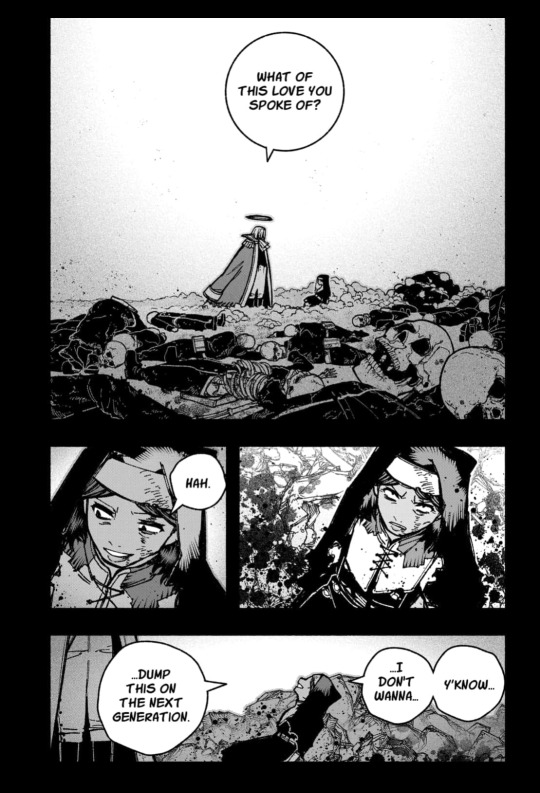
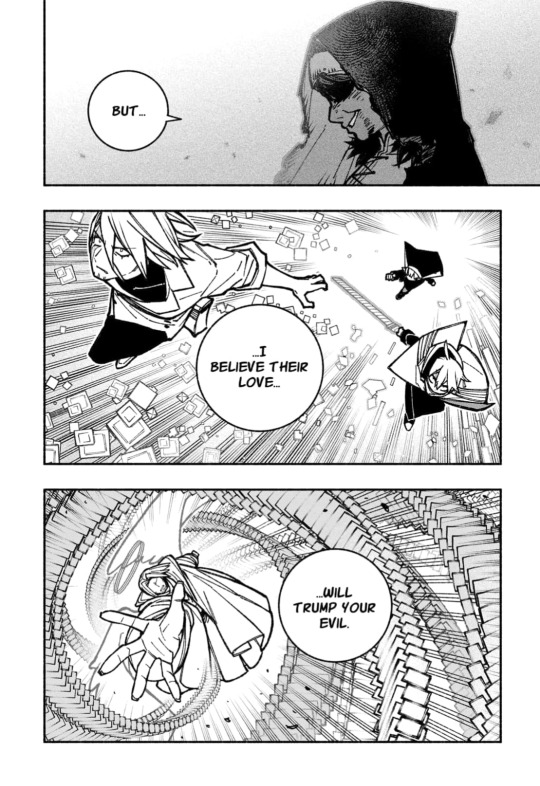
the intersection between love and duty is something mtefil interrogates. leah takes the duty of revenge for her family upon herself & ultimately her love for barbara triumphs.
dante has chosen duty over verge—and what is his thought process for doing so? he is one of the few adult exorcists, he understands verge's grievances with the church, he is clearly miserable (& suicidal. and does in fact kill himself!) so why then does he stay?
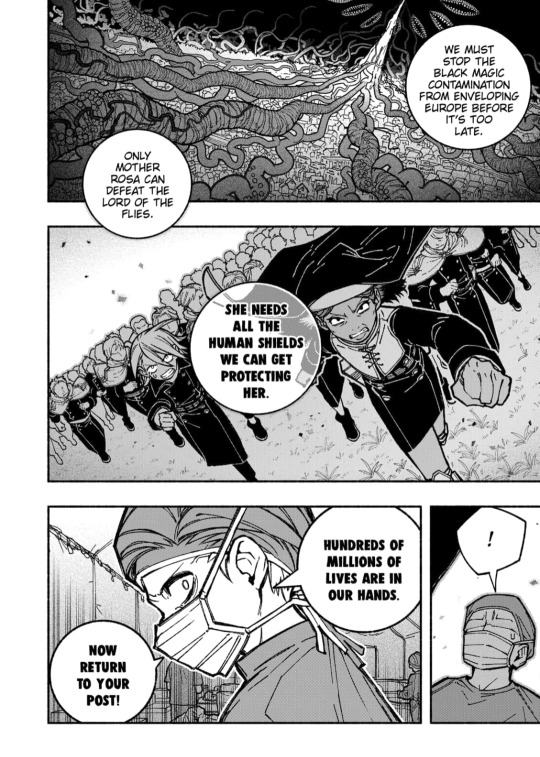
something to consider in the mtefil universe is that hell and demons are real. <millions may have died> if beelzebub was allowed to continue his rampage.
who would've stopped him if not the church? beelzebub is most malevolent of the demon lords (he's even referred to as <the worst of the worst> in the latest chapter lmao) but truly, what would stop leviathan or mammon from also cutting a path through a continent? it's not their style to do something like that, but how do ants understand the thought process of giants?
[1] the church exists out of a fear that is concrete in the mtefil universe & i really do appreciate the manga's writing in this regard. it would be very easy to make the church tropey one-note jrpg villains, yet the extras (im too sleepy to add sources rn, but if you send an ask i will note them) take pains to confirm that the church is not a monolith, believers exist within the church that disagree with the overall direction, there's even a schism between the pope and cardinal heisenberg—
and of course ultimately this does not cancel out the church's crimes against innocents.
the church styles itself as benevolent defenders, but to the more cynical church adults (i count daniel and dante here) they see themselves as a necessary evil. see how clinically dante and daniel talk about priest here.
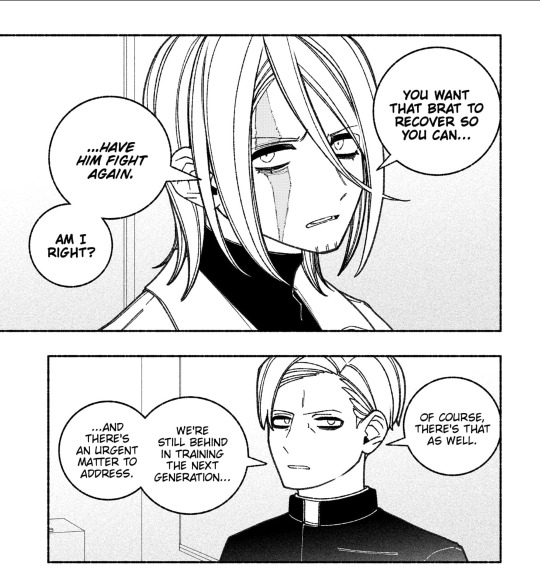
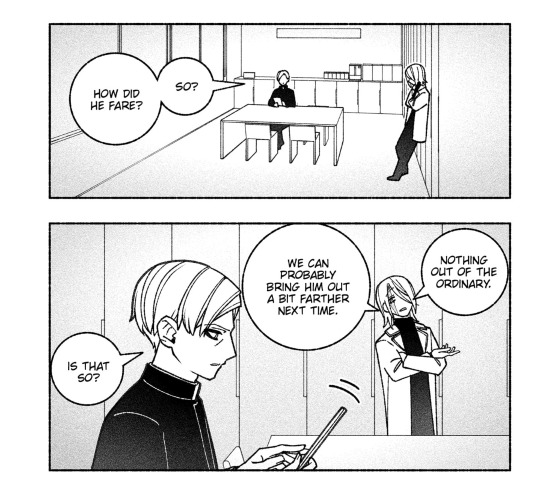
these are adults who have internalised being a cog in the greater machine. they're aware that they are fighting a losing battle (demon lords after all, regenerate and humanity's sins can never be completely cleansed) and they have resigned themselves to that. they feel for the younger generation, but they're all of them soldiers that have been conscripted into a war that's been going on longer than they ever existed.
the demon lords are an unstoppable force, and the church is an immovable object, and witches, human victims like leah's family, and demons like imuri who want to find a peaceful existence—will be stuck between them unless the status quo changes.
the question of god.
this section is just my conjecture—but i personally think we will never really see god in mtefil. we get both views of god:
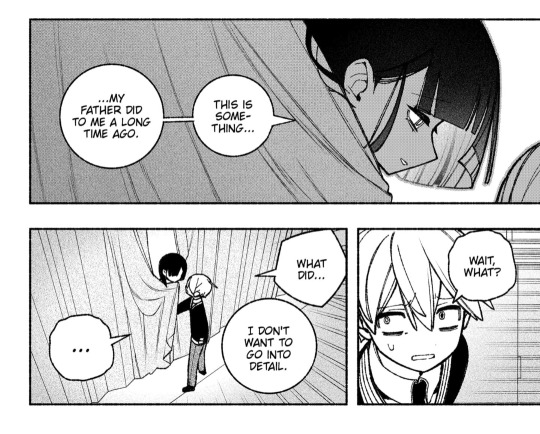
god as terrifying, high-handed and cruel, and god (or faith) as salvation for the people to hold onto when they have very little else.
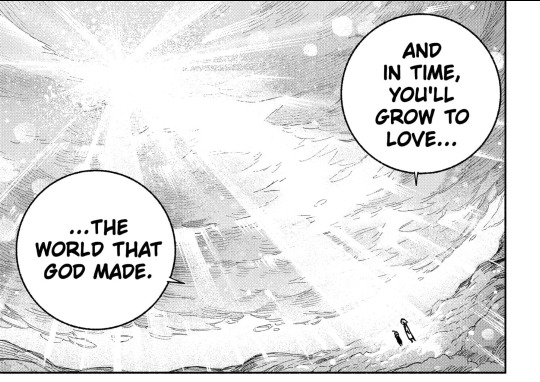
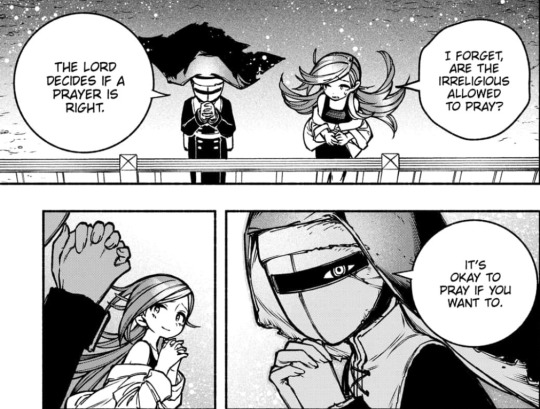
schrodinger's cat—two important panels i think of when it comes to god's position in the mtefil universe is priest telling verge that it sounds like he believes in god (and indeed, priest uses scripture from the gospel of john to save people later in the chapter) and dante accusing verge of wanting to "take even god away from people."
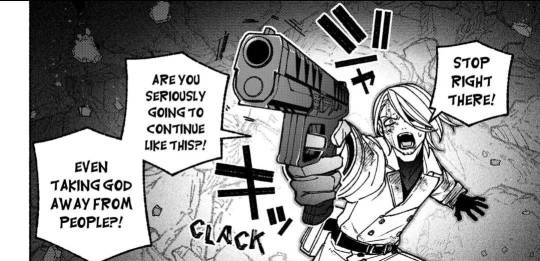
verge has come to the conclusion that the current story must be destroyed and rewritten, and god as currently conceived is evil. dante (my interpretation here) insists that god as currently exists is still preferable to no god at all (& remember that this is a practical line of thought given we haven't seen how sinners and the damned are treated in gehenna...)
imagine: you know hell is real; would you still kill god (who is ineffable and ambiguous, for the chance of creating a better world? it's a decision only someone who is extremely determined can make-and i am so interested in what the witches' endgame is.)
lastly: i personally think it would be rather cheap of the manga to straightforwardly state that the faith the church cast has in god has been misplaced, and that god is malicious. like dgmw—growing up, his dark materials was one of my favourite books. im familiar with and love narratives about killing aod. tonally however, i do not think mtefil will go here.
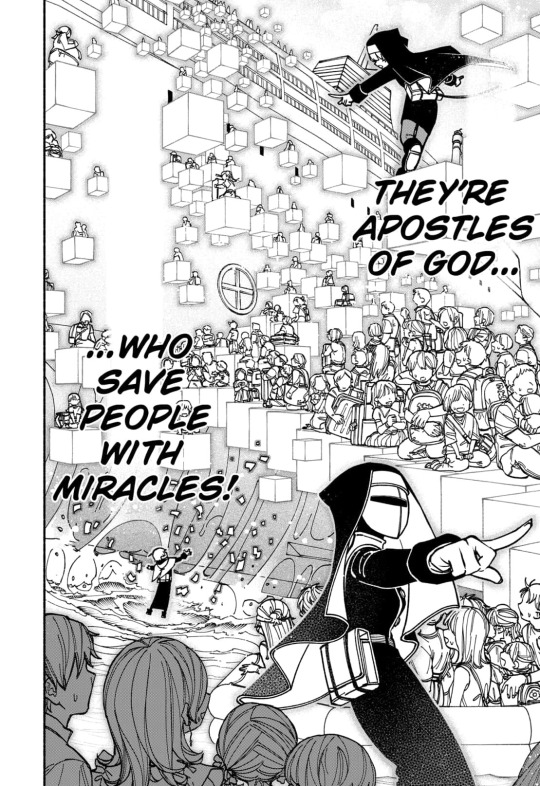
reference to the page where imuri watches in awe while the exorcists save people—this, to me, is what potentially the endgame of the manga could be. a reordering of the world where exorcists do not have to fight demons, and miracles can be used to save people, and not just kill demons.
if you've read this far, thank you. i'd love to hear other people's takes (must add that i am very bad at replying on tumblr tho. i shall try my best.) also tumblr deleted half of this post while i was typing it up so. apologies if i sound incoherent as fuck.
#make the exorcist fall in love#mtefil#anya.txt#anya writes meta#holy fuck i haven't yapped this much on tumblr since the great Ch*insaw M*n hyperfixation of 2023#mtefil meta
49 notes
·
View notes
Text
Hybern headcanons for my fic and and!!! Drawing Niamh and KoH finally for father and daughter bonding time omg I had to draw them else i lose my miND

He teaches forces her to learn spells since she was a lil wee baby 🤏 In Hybern, children are branded with golden cuffs and the third sons/daughters are given to the authorities so they may start their training. Because I always wondered where the hell he's getting his armies from.. KoH really said military conscription is rated E for EVERYONE 💥💥 now who does that remind me of... Niamh is not an exception, but she is trained both in magic and the sword. She learns forbidden spells KoH is willing to feed her, magic that goes beyond the limits of normal fae's natural reserve of power, making her a witch, against her will tho bc what is she going to say? no 🤨?? He also likes to do experiments. On people. But that's for another day I fear it will get dark
This is their theme song fr bc im a musical girlie and so is KoH probably. He gives me theater kid vibes don't ask can you not see him breaking into an evil musical number anytime he enters a room bc i can..
#acotar oc#oc art#king of hybern#hybern#theyre giving gothel and rapunzel#giving frollo and quasimodo#giviiiing coraline and the other mother#insert any toxic parent child dynamic here#i want to do dramatic pieces where he's less silly and more evil hnnng#BC HE IS SICK IN THE HEAD#but im more wuss when it comes to drawing it than writing it 😭#im not that mean to my ocs i swear..
56 notes
·
View notes
Text
im glad the person who said “it would be very yoongi to leave without saying bye aha 🤪” on twt got jumped for two reasons 1) we have far less tolerance for this weird view of yoongi and 2) was the tour not enough? or the album? or the documentary? why are u owed a goodbye? let him rest? SHUT UP?????
#i joke in jest about missing him but at least I’m actively self aware enough to know the evils of forced conscription stealing 2 years of—#—someone’s life is not abt me getting a fucking weverse post.
11 notes
·
View notes
Note
Hi! I was wondering if you happen to know of any ttrpgs that utilize dragoons as a class option/thematic presence?
THEME: Dragoons
Hello, so when I followed up with you, you mentioned that you wanted dragoons from Final Fantasy, rather than the historical dragoons - and I’m glad I clarified, because I was sifting through historical games at first. From what I understand, the main points of dragoons is that they are a class who fights with a spear, with strong elements of launching themselves into the air/attacking from heights to land hits with extreme force. I also understand that they are meant to have strong relationships to dragons. So let’s see what we’ve got.







Final Fantasy Legend Edition, by Mildra the Monk.
This is an intermediate-complexity tabletop roleplaying game based on the Japanese console RPG series, Final Fantasy.Whether you're a veteran or someone new to the series, these streamlined rules and various customization options will help you get started with ease.
When I went to check out this game, the Dragoon class was the first image listed on the storefront. This class comes with some classic jump abilities, and other character abilities that are all about pinning down your enemies from the air. You also have access to the appropriately-themed Dragon Arts, tying your character intimately to their historic roots. The game itself moves through what it calls a four-phase structure: Preparation, Exploration, Encounter and Downtime. Each arc is likely to follow a quest that has been given to your characters, and these four scenes give you a procedural structure that typifies many ttrpgs.
Megalos: Crystalpunk Fantasy Roleplaying, by matara.
MEGALOS is a game for telling stories about adventures in the clouds, fighting evil empires, and dueling ancient gods. The Worlds of MEGALOS are vast and old, each a cosmic emanation connected to one another by the Wellspring- the source of all aether in the cosmos. Make your own World of MEGALOS or play in one of ours, from the Oradam Rift to Pallid Telkane to Zone Gachette to The Erefane. Soar through the air in an airship, dogfight imperials, and wield aetheric magicks as a punk-rock witch.
This tabletop game is inspired by things like classic JRPGs, electronica music, and medieval alchemy. MEGALOS is the first game to use the SLIPSTREAM game engine, which uses pools of d20s as the core of its task resolution mechanic.
The martial damage class for Megalos is called the Throne, and it hast at least two subclasses that I think you could use to make a Dragoon-like character. As a base class, Thrones have access to a flight ability called Liftoff, and both Arklights and Champions use this ability to do some neat things with combat.
Arklights are warrior monks, interested in the “protection and cultivation of ‘good’”. They have a lot of light and wings metaphors, including an ability called Falcon Dive, which allows you to dive at your opponent while in the air, with an upgrade ability to inflict piercing damage to multiple enemies. Then there’s the Champions, fighters who are all about learning new techniques and experiencing combat as a way of life. They’re very brawl-friendly characters, but their abilities Aerial Charge (which launches you in the air) and Meteor Drop (which is practically a dive-bomb attack) give me pretty strong Dragoon vibes.
Lancer, by Massif Press - and the Field Guide to Suldan, by KaiTave.
Lancer is a tabletop role playing game centred on shared narratives, customizable mechs, and the pilots who crew them. Set many thousands of years from the present day, Lancer imagines a future where a survivor humanity has spread to the stars after weathering terrible ecological collapse on Earth -- the end of the Anthropocene as a consequence of unrestrained consumption and poor stewardship.
Lancer features a mix of gritty, mud-and-lasers military science fiction and mythic science fantasy. In the setting, conscript pilots mix ranks with flying aces, mercenary guns-for-hire brawl with secretive corporate agents, and relativistic paladins cross thermal lances with causality-breaking, unknowable beings.
Lancer’s big thing is the ability to make a mech that can do some really cool things, all based around combat. You build your mechs with pieces you gain access to through licenses, many of which are distributed by various companies and organization. The base game has the IPS-N Nelson Frame, which is all about close-quarters combat and high mobility, with a gigantic War Pike that can puncture armour. If you want to go full Dragoon mode though, you’ll want to download the Field Guide to Suldan fan expansion, which has an additional frame option for the Nelson, giving you the power of flight - and an ability called Drive Burst, which allows you to move really fast in one direction and do a whole bunch of extra damage to anyone in your way.
If you want a game that’s all about figuring out neat combos and making your machine really really good at specific things, you want to try Lancer.
Fabula Ultima, by Need Games.
FABULA ULTIMA is a Tabletop Roleplaying Game inspired by Japanese-style console RPGs, or JRPGs. In Fabula Ultima, you and your friends will tell epic stories of would-be heroes and fearsome villains, set in fantasy worlds brimming with magic, wondrous locations, and uniquely bizarre monsters!
A game that is typically advertised for folks who want a Final Fantasy experience, Fabula Ultima is likely going to hit a lot of similar plot beats and game moments that feel familiar. When it comes to character creation, you are expected to put together a few different options to make someone with a lot of cool talents that you can expand on as you grow.
One of the pre-gens in Press Start, a quick-start version of the game, looks fairly Dragoon-like, with a heavy spear and a move called “Soaring Strike” that looks like it can send you airborne to fight flying enemies, so I think it should be fairly easy to make the kind of character you’re looking for.
First Fantasy, by Marc Strocks.
A one-page RPG created for the game(s) jam. In the year 199X, technological cities grow thicker by the day, feeding off the planet's resources. Demonic fiends fill the wilds, attacking anything that moves. With a weapon by your side, you travel the world. This is your mission. This is your story.
First-Fantasy is a single page full of a lot of roll tables, both for character creation and adventure creation. This game feels like it’s relying on folks who are well acquainted with the lore and tropes of Final Fantasy, and gives you a few tools to add chance to your story. Character creation is pretty slim, but the Dragoon class does give you the basics: a spear or a sword, a Jump-charge ability, and the metal plate you’d probably expect a knight of some kind to wear.
UMBRA, by Star Bear Games.
UMBRA is a Table Top Role Playing Game in which you delve into a world of bug Knights! It features the quick and snappy combat of the LUMEN system.
Under and within a grand oak tree lays a sprawling metropolis known as the Cradle. Making their lives under the watchful rule of the Ashen King, are the bugs of the Cradle. Every bug has a part to play, big or small, in the kingdom. For you, oh noble Knights, your part is that of protector.
Inspired by Hollow Knight, I thought about Umbra for two reasons: one, because the titular character of the game does a lot of jumping when in combat, and two, because this game is based in LUMEN, which is all about modular combat and strategy.
You cobble together a few different things to make your character unique, including a House, a weapon, and armour called Regalia, which give you different abilities or advantages. If you want to make a Dragoon-like character, I’d recommend making a bug from Horn House, which gives you the hard-hitting, high-damage typical of an armour-puncturing spear. You’d then make your spear by taking a Point weapon and giving it tags like Reaching, to give yourself the ability to stab from a distance. Then for Shell regalia, you can take either Hovering Wings, which gives you the ability to fly, or Propelling Wings, which give you heightened jumps, allowing you to stay in the air for extended periods of time.
If UMBRA itself isn’t the setting that you want but you like this level of customization, then I recommend checking out some other LUMEN games for different genres, but the same easy-to-learn fast-action strategy.
RottenFall Heroes, by LazerSamuraiGG
In a world forever changed by cosmic disaster, ordinary lives collided with the extraordinary. It all began with the sudden appearance of mysterious beings, turning unsuspecting humans into monstrous entities known as the ROTTEN. The trigger? A mysterious collision between an Obsidian Pyramid and the moon.
As if this upheaval wasn't enough, interdimensional beings known as VILLAINS seeped into our reality, distorting familiar landscapes into surreal nightmares.
Yet, amidst the turmoil, emerged a glimmer of hope – the Heroes. These courageous individuals joined forces, establishing schools and enterprises to combat the encroaching darkness. They ventured forth into the warped realities, confronting villains and safeguarding the innocent.
Mechanically, I cannot honestly say that RottenFall Heroes has anything that looks like a Dragoon in fighting style. However, what it does have is a class called a dragon knight, which involves a person who has a solemn pact with an ancient Dragon, who has granted them access to special powers. In Dragon Form, you are especially talented at wielding two-handed weapons, and I think you can choose a spear or lance if that’s what you desire. You can also re-roll your attacks when fighting with your clawed hands, and you’re resistant to fire. If you want the connection to dragons more than the ability to jump really high and pile-drive someone from the sky, then you might be interested in RottenFall Heroes.
You might also want to check out…
The Fire Emblem recommendation post I put up a couple of weeks ago.
The Official FFXIV TTRPG has Dragoon options! And it looks like there are free versions of the rulebooks.
This playbook for SLAYERS is all about playing a Dragoon-like character.
39 notes
·
View notes
Text
A tribute to him and to all who do good in evil times
Karl-Heinz Rosch 1926 - 1944


Who was Karl-Heinz Rosch and who were the two Dutch children he saved?
Karl-Heinz was a young German, conscripted into the Wehrmacht as a teenager in 1944 and billeted with a Dutch family on a farm in the small village of Goirle. Despite being a member of the occupying forces he got on well with the host family and showed them care by warning them of approaching German officers to their farm.
Just days after his 18th birthday, on 6th October 1944 the Wehrmacht engaged the allied forces and the farm came under attack by artillery fire with little warning. The young brother and sister, Jan and Toos Kilsdonk, who lived at the farm, were just 4 and 5 at the time and were still playing in the field when the attacked happened. Karl-Heinz ran to them under fire and carried them under his arms into the farmhouse to safety but was killed by the artilary fire just moments later.
In 2008 a statue was erected in Goirle in memory of the young man on which the inscription reads, “This statue is a tribute to him and to all who do good in evil times". A tribute to a boy who had dreams of becoming a forester before the war.
As of today, Jan and Toos are still alive.

#ww2 germany#ww2#german history#This story reminds me of Otto from The Long Long Holiday#not a resistance story#just humans being human
22 notes
·
View notes
Text
Playing a Heroic Necromancer in DnD 5e

Necromancy is one of the most evil-skewed powers in just about any fantasy setting. However, unless you're running a villain campaign, most DnD parties are made up of heroes who won't like having an evil character in their midst. You want to play a necromancer, but you also realize that DnD is a very collaborative game. So, how do you make your party more amicable towards the thought of you raising a family? Here's some possible backstory ideas that can fuel a heroic necromancer for your next campaign.

The Scholar
The taboo, illegal, or forbidden nature of studying necromancy drew your interest. Whether you studied with a secret sect, uncovered a grimoire of necromantic magic, or made a deal with a devil for profane knowledge, you were driven by a desire to study magic. The sparse availability of necromancy forces you to remain mobile, making party formation easy. You may be hunted by law enforcement, clerics of Kelemvor, or other necromancers angry at you for stealing their arcane secrets. And now that you know what so many tried to hide from you, it's your choice how to use it.

The Chronicaller
History is written by the victors, the rich, and the powerful. But every life holds valuable knowledge and secrets. Ancient bones know things lost to time. Knowledge that was never written down. Stories which have not been spoken in centuries. Opinions of the common people during a historical event. Experience with phenomenon that can no longer be encountered. The Chronicaller wishes to unearth the secrets of the past already laid to rest.
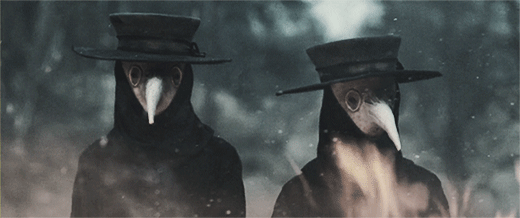
The Physician
The Frankenstein of Necromancers wishes to understand the medical and scientific elements of life and death itself. To understand the body by inspecting it and digging into it. They may study how to cure diseases or how to spread them. Try to find a way to slow or even halt the slow decomposition that turns the body elderly and frail.
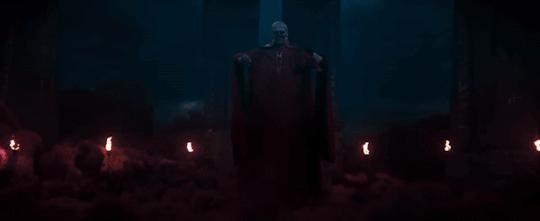
The Thayan Rebel
Once a Red Wizard of Thay, you have left Thay and the Red Wizards, letting your hair grow back slowly as you seek to expand your arcane talents beyond the limitations of Thayan conquest and oppression. The Red Wizards and Szas Tam become personal antagonists for your character and party as a result.
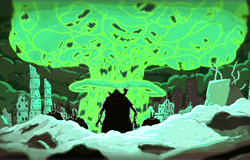
The Undead
Be they a Revenant, a Dhampir, a Vampire, a Lich, or something else, they are already imbued with undead power. They simply embrace their anti-life energy already flowing through them, channeling a power most others would avoid. You may be undead, but you desire to staunchly defend the living from other undead who are less compassionate.

The General
A wizard with a soldier background and optional martial multiclassing, your undead horde is your army of loyal soldiers, putting their lives on the line again and again to serve their general. An Oathbreaker 7/wizard 6 adds your CHA mod to undead within 10 ft, and proficiency bonus to all undead you control. But the steep dip into paladin locks you out from higher level spell slots for stronger undead minions.
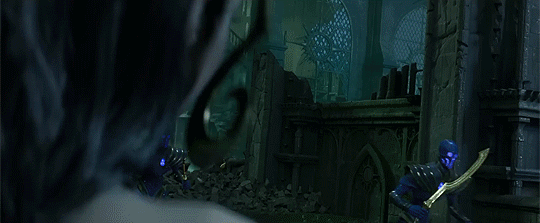
The Noble
Similar to the general, the undead serve you out of loyalty, not fear or force. But where the general commands their soldiers, the Noble may command their staff of servants, their commoner citizens, their knights and soldiers, or their own noble ancestors. The Noble utilizes their horde to fulfil the services and duties of their noble house. They're just as likely to conscript skeletons to pave a road or build a bridge as they are to form a wave of zombies to break up a smuggling ring in their city.
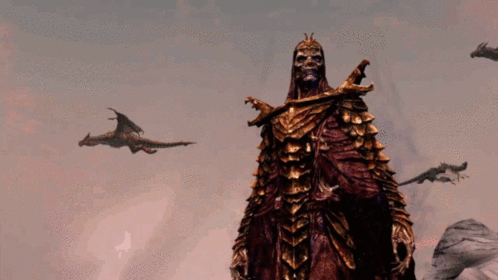
The Immortal Guardian
You have or want to become immortal not out of power hunger or greed, but to protect the innocent forever as an unwavering guardian against evil. Everyday people can't protect themselves, and even legendary heroes die eventually. Only an immortal protector can be an eternal defender of the people.

I hope if nothing else, this gave you some ideas for some good and noble necromancers you could bring to your next table. Did I miss any Heroic concepts that you thought of? Let me know, and help make the world a more morbid place.
#dnd#dnd 5e#dungeons & dragons#dungeons and dragons#necromancy#necromancer#lich#wizard#wizards of the coast#vampire#baldur's gate 3#bg3#undead#skeleton#Halloween#happy halloween
199 notes
·
View notes
Note
im from another country that has mandatory military service (although admittedly it's not as bad as what israelis go through) and like. let me get this straight. the official leftist position on conscripts is that they're ontologically evil? okay. i hope these losers get deployed on fucking kiev or some shit lmao
And all the people harping on about how mandatory servive is evil don't even do anything to get rid of it in countries which have it.
Like they legitimately expect countries which have it to just stop without any advocating otherwise they are doomed to be evil forever.
And like, there are issues with mandatory service around the globe, but the issues are with drafts, not the people forced to do it
32 notes
·
View notes
Text
With the Archdemons gone, the power fueling the blight corruption calmed to the point that Wardens might no longer hear the Calling or even supposedly be cured in some cases, the First Warden dead, their numbers thinned by heavy casualties, their headquarters in disrepair, and the griffons possibly finding a new path... I really wonder what is next for the Grey Wardens, as an order in Thedas.
Obviously darkspawn are still a threat and the taint itself still damages everything it touches. But maybe the Architect will return maybe the dwarves can regain some of what has been lost for ages.
There are Wardens like Antoine and Evka who not only battle the blight, but study it and try to reverse its effects. There's Flynn, the medic who became a Warden to save their life but chose to help people in another way. Hell, I'd bet with them around we could have a functional vaccine for the blight sickness figured out within a decade, no side effects, no conscription needed.
Even if they are given another chance to do right by the griffons, it would be interesting if the Wardens shifted from a reactive combat-focused force to something more based on research and restoration. The blight isn't pure evil, as the First Warden claimed. It's alive, and it's hurt. It is a shattered dream given form. But maybe the flowers can grow again.
#dragon age#dragon age the veilguard#datv#datv spoilers#da4#dragon age veilguard#dragon age: the veilguard#grey wardens
36 notes
·
View notes